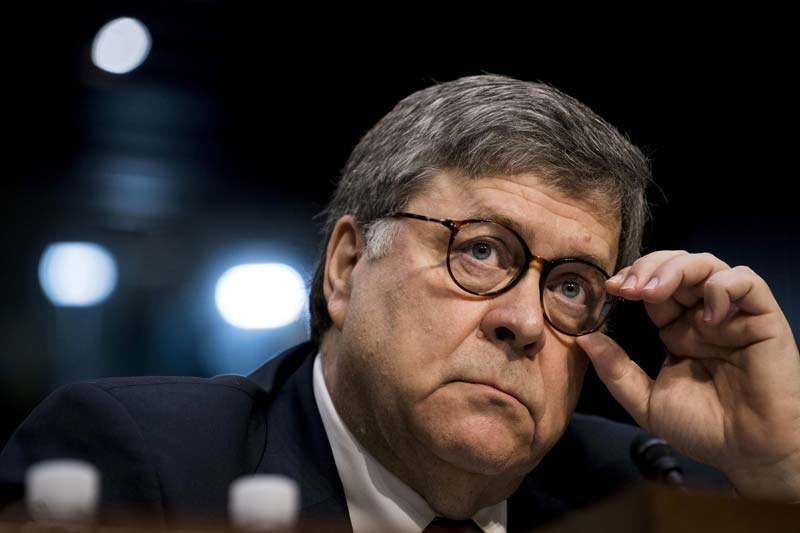 Melina Mara for The Washington Post
Melina Mara for The Washington Post
We've gone from Donald Trump allegedly betraying the nation to Barr allegedly betraying the nation, from potential Trump impeachment to potential Barr impeachment.
Barr's offense is writing a quick letter summarizing the top-line conclusions of the Mueller report. Ever since the attorney general released the letter, he's been the focus of conspiracy theories and the target of smears. He's been routinely called, even on respectable TV shows, the equivalent of Roy Cohn, the scuzzy lawyer who once represented Trump.
The anti-Barr fury reached a new level with a Washington Post report that Mueller wrote him a letter complaining about the summary.
Not since the Zimmermann telegram has a missive so exercised Washington, at least the segment of it that's been in a perpetual lather of outrage and seeing the shadows of dastardly conspiracies ever since November 2016.
Let's be clear. If Barr wanted to cover for Trump, he could have crimped the Mueller probe, sat on the report, or redacted it into meaninglessness. He did none of the above.
Barr's offense is releasing his summary of findings. No one can claim it was inaccurate. According to Barr, even Mueller conceded as much in a phone call after the special counsel sent his letter. Mueller instead complained about the press coverage of the summary, which isn't strictly speaking the attorney general's responsibility.
Indeed, Trump's initial claim of total exoneration was made in explicit contradiction to Barr's stipulation that Mueller hadn't exonerated him on obstruction. But it wasn't the attorney general's job to "Trump-proof" his summary.
Besides, the president was going to claim vindication whenever it became clear that Mueller had come up empty on Russia collusion, the alleged perfidy that got the investigation started in the first place.
Barr's conduct is defensible on its own terms. He wanted to get the basic verdict out -- to use his analogy from his Senate Judiciary Committee testimony on Wednesday -- because the investigation had so roiled our national life, especially the possibility that there was coordination between the Trump campaign and a foreign power.
When Mueller came back to him with his letter requesting the release of the summaries from the report, Barr declined because he didn't want to get into piecemeal releases when the entire report was going to be made available to the public soon enough.
That's what makes the Barr controversy so nonsensical. He went further than he had to under the regulations to release the entirety of the report, letting everyone read it and decide for themselves. What else was he supposed to do?
Of course, Barr's summary letter inevitably lacked the narrative force and details of the 400-page report, but we know that … because he released the report.
The notion that Barr perjured himself or was deceptive in congressional testimony is similarly absurd. In an exchange with Sen. Chris Van Hollen last month, he was asked whether Mueller supported his "conclusion," meaning his judgment that the president didn't obstruct justice. Barr accurately said he didn't know. He wasn't asked about Mueller's view of the summary letter.
An exchange with Rep. Charlie Crist was more on point. Crist asked Barr whether he knew what Mueller officials anonymously complaining about his letter were referring to.
Barr said he didn't (he presumably hadn't talked to these anonymous officials about their concerns), but volunteered that they probably wanted more information out and explained why he opposed releasing summaries from the report.
Barr could have disclosed then that Mueller had written him a letter, but he might have -- naively -- thought their communications were private. The Mueller letter was clearly written to leak and indeed was strategically leaked on the eve of Barr's Senate testimony.
Ultimately, the firestorm over Barr's summary letter is a misdirection, and he's a scapegoat. If Mueller wanted to recommend charging Trump with obstruction of justice, he could have done so. Instead, he punted and now he -- or some people around him -- are upset that the Barr letter accurately stated his convoluted not guilty/not exonerated bottom line.
As for Democrats, if they disagree with Barr's conclusion that Trump didn't commit a chargeable crime, it is fully within their power to impeach the president for abuse of power. The standard that Barr was adhering to -- whether there was any chance of proving obstruction beyond a reasonable doubt -- is more stringent than that for impeachment, which doesn't even require the commission of a crime.
Democrats still want someone else to do their work for them. First, they wanted Mueller to blow Trump out of the water, and now they want Barr to adopt an adversarial posture toward the president and will pronounce themselves shocked at anything less.
If it isn't Barr's job to be the president's lawyer, as his critics routinely say, it's not incumbent on him to be the lawyer for the #resistance, either.
Barr is not the one distorting procedure or norms here. It's the Mueller team that avoided making a call on whether Trump had committed a crime -- the job we ordinarily ask prosecutors to do -- yet catalogued his conduct in a quasi-indictment written for public consumption anyway, which prosecutors aren't supposed to do, and now, we know, cared very much about the media narrative around its report, a public relations or partisan question, not a legal one.
That Barr and his letter are now the focus of such political and media ire is a symptom of the lunacy of this era, rather than anything rotten in his DOJ.
Sign up for the daily JWR update. It's free. Just click here.
(COMMENT, BELOW)


 Contact The Editor
Contact The Editor
 Articles By This Author
Articles By This Author